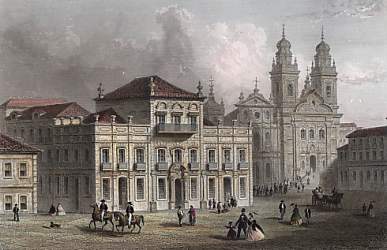
 |
The Court in Brazil |
Despite its major economic development at the end of the 18th Century, Portugal was not able to follow the steps of other European countries, chiefly England, with which it maintained close commercial ties and where the industrial revolution was proceeding at full steam. The State, tied to an ancien régime, showed itself to be worried and confused by the new things from the French Revolution, but refused any kinds of reform, thus paralysing the Kingdom and disturbing economic growth.
With the invasions of Portugal by the French troops of Napoleon - in 1807, 1809 and 1810, the King, D. Joćo VI, moved to Brazil and declared Rio de Janeiro capital of the empire. He would stay there for around a decade and Portugal thus became the only European state to have its representative and respective court outside the continent. This move to the tropics by a court which was a hostage to the formalism and etiquette of Europe, forever changed the image which the inhabitants of the Brazilian colony had of their King and would lead later to the independence of Brazil in the first quarter of the 19th Century.
Having been one of the first States to have an absolutist regime, and as such even ahead of its time, Portugal rejected any reform and change to a constitutional system would only happen in the middle of the 19th Century after a bloody civil war. On the one side, the liberals headed by D. Pedro, oldest son of D. Joćo VI and emperor of Brazil, would demand a Constitution and argue for profound changes within the mechanisms of the State. On the other, the followers of D. Miguel, the youngest son of the Portuguese King, who supported a return to the traditional monarchy in which the power of the King could not be contested nor limited by constitutions.
The liberals ended up winning, but the economic destruction caused not only by the civil war, but also by the French invasions and the loss of Brazil, led to a long period of political instability and economic decline. Thus is was that the State turned to Africa, where it still held extensive lands, though without the means to populate them or defend them militarily, at a time when the great powers were carrying out a policy of effective occupation of their African colonies.
Portugal thus worked on the colonisation of its
territories of Angola and Mozambique, and reinforced this with a
military occupation. The dream of a new Brazil - this time in
Africa and coast to coast, uniting Angola and Mozambique through
territories regularly crossed, but never occupied, was impeded by the
English imperial ambitions, in an locking of arms which the British
Empire ended up winning. The Portuguese monarchy, fatally wounded by
the successive concessions made to the English, started to become even
more unpopular; Republican movements started to gain ground.
| Republic and "Estado Novo" |